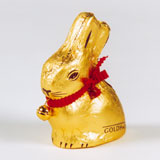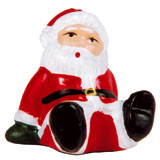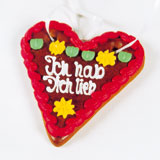Customs and Public Holidays
National Public Holidays
Generally these days are work-free, but some service industries like cafés, bakeries, restaurants and cinemas are open. Christmas and Easter are traditionally holidays where families come together. The religious importance is generally seen as being on the decline.
The beginning of a new year is celebrated on the night of December 31 to January 1st. Just like in many other countries, there are big New Year’s Eve celebrations and at midnight there are fireworks as a salute to the New Year. January 1st (New Year’s Day – Neujahr) is a national public holiday.
Easter with Good Friday ("Karfreitag"), Easter Sunday ("Ostersonntag") and Easter Monday ("Ostermontag") is the most important festival in the Christian calendar in Germany. It is the oldest Christian festival and marks the death (crucifixion) and resurrection of Jesus Christ on the third day after crucifixion (Easter Sunday). The crucifixion and resurrection are cornerstones of the Christian belief. The death is not seen as the end but as redemption. Easter is celebrated on the first Sunday after the spring full moon. Good Friday and Easter Monday are public holidays.
The 1st of May is a workers holiday, like in many other countries. The German Trade Union Association (DGB) organises demonstrations and political gatherings in numerous cities across Germany on the morning of the 1st of May. The evening before the 1st of May is the time for the traditional "Tanz in den Mai" ("Dance into May") parties. This follows old traditions to celebrate the spring month of May. In some areas Maypoles ("Maibäume") are erected. This is also an old tradition; the maypole originally symbolises the fertility of spring.
"Ascension Day" is the 40th day after Easter and represents the ascension of Jesus to His Father in Heaven. Ascension Day always falls on the Thursday nine days before Whitsun.
Whitsun or Pentecost ("Pfingsten") is celebrated with Whit Sunday ("Pfingstsonntag") and Whit Monday ("Pfingstmonntag"). This is the 50th day after Easter. This commemorates the descent of the Holy Ghost among the apostles of Jesus, which was the starting point of their missionary work. Whitsun can therefore be described as the birthday of the church. Whit Monday is a public holiday.
The 3rd of October is the day East and West Germany were officially reunited in 1990. This national holiday is similar to "Independence Day" on the 4th of July in the US or "Bastille Day" on the 14th July in France. In Germany, however, celebrations are much more muted. There are no military parades; just festivals and gatherings with political speeches in parliament and many town halls.
Christmas ("Weihnachten") encompasses three days: 24th of December – Christmas Eve ("der Heilige Abend"), 25th of December – Christmas Day, which is the birthday of Jesus Christ, and 26th of December – Boxing Day, the second day of Christmas. Before or after attending the church service on Christmas Eve, Christian families light the candles on their Christmas trees in readiness for the so-called "Bescherung", the exchanging of gifts. Christmas carols are sung or played and the family members exchange presents. Children are told that Father Christmas or the Christ Child brought the presents. Many families "rent" a Father Christmas for the evening, often played by students dressed in the traditional red and white costume, with a white beard. On the first and second days of Christmas, many people attend church services and mass. The 25th and 26th of December are public holidays.
Regional Holidays
The following holidays are only public holidays in the states mentioned.
This is celebrated in Bavaria, Baden-Württemberg and Saxony-Anhalt. Epiphany is a feast day to celebrate the birth and baptism of Jesus Christ. On this day children dressed as the Three Kings, or the Three Wise Men, write the letters C + M + B above the doors of houses ("Hausweihe"). These signify "Christus mansionem benedicat" – "May Christ bless this house".
The Feast of Corpus Christi ("Fronleichnam") is a Catholic festival celebrated on the second Thursday after Whitsun. Corpus Christi means the Body of Christ and refers to the elements of the Eucharist. This is a public holiday in Baden-Württemberg, Bavaria, Hesse, North-Rhine Westphalia, Rhineland-Palatinate, Saarland, Saxony and Thuringia.
The Feast of the Assumption is to celebrate the Mother of Jesus, Mary, being taken into Heaven by God, in body and soul, and is only a holiday on 15th August in Bavaria and Saarland.
Christians of the Protestant faith celebrate Reformation Day on the 31st of October. It is a public holiday in Brandenburg, Mecklenburg-Western Pomerania, Saxony, Saxony-Anhalt and Thuringia. The holiday commemorates the Reformation of the Church by Martin Luther in the 16th century, which created the formation of a new religious group, the Protestant-Lutheran Church.
Saints, martyrs and the dead are honoured each year on 1st of November. The graves and cemeteries are decorated by relatives. Catholics light candles, the "Seelenlicht", which also glow on the following All Souls Day. These symbolise the "eternal light" that provides illumination for the dead. It is a public holiday in Baden-Württemberg, Bavaria, North-Rhine Westphalia, Rhineland-Palatinate and Saarland.
Penance Day is celebrated on the Wednesday before the last Sunday in the Church year. The first protestant Penance Day was celebrated in 1532 in Strasbourg as a reaction against the Ottoman wars. It is only a public holiday in the state of Saxony.
Easter

The Easter Fire and Easter candles also form part of the Easter festival. They symbolise Jesus Christ’s resurrection and triumph over the darkness of death and sin. Pagan and mythical motifs live on in many of the popular spring customs that take place at Easter, and which were later filled with Christian symbolism. Two central symbols are the Easter egg and the Easter bunny. According to age-old beliefs, eggs are considered to be the origin of life. The hare is the symbol of fertility. The tradition of painting Easter eggs in bright colours goes back hundreds of years. On Easter Sunday, parents hide the painted Easter eggs, chocolate bunnies and other sweets in their gardens or apartments for the children to hunt and find.
In his poem "Der Osterspaziergang" ("Easter Stroll") Germany’s most famous poet, Johann Wolfgang von Goethe, describes the end of winter and the beginning of spring.
Vom Eise befreit sind Strom und Bäche
Durch des Frühlings holden, belebenden Blick,
Im Tale grünet Hoffnungsglück;
Der alte Winter, in seiner Schwäche,
Zog sich in rauhe Berge zurück.
(…)
Jeder sonnt sich heute so gern.
Sie feiern die Auferstehung des Herrn,
Denn sie sind selber auferstanden.
(…)
Selbst von des Berges fernen Pfaden
Blinken uns farbige Kleider an.
Ich höre schon des Dorfs Getümmel,
Hier ist des Volkes wahrer Himmel,
Zufrieden jauchzet groß und klein:
Hier bin ich Mensch, hier darf ichs sein!
The Easter Marches are a protest movement of the peace lobby. The first Easter March in Germany took place in 1960. Pacifists organise protest marches against war and military proliferation during the Easter holiday period.
The Pre-Christmas Period
Martin’s Day is on the 10th or 11th of November, depending on the region. Children form a procession carrying lanterns moving from house to house, singing or reciting poetry and hoping for gifts. The legend of "Martin of Tours" says that, when he was a young soldier, he shared his overcoat with a freezing beggar. The "Martin’s Fire" ("Martinsfeuer") burns away the summer to make way for the coming spring.
"Advent" is the four weeks leading up to Christmas. The Latin word "adventus" means "arrival". It refers to the period of preparation for the coming of Jesus on the first day of Christmas. Many families have what is known as an "Adventskranz" ("Advent crown") with 4 candles. A candle is lit on each of the four Sundays of Advent. During Advent, sweet pastries are often eaten and Christmas decorations are put up around the home. An "Adventskalender" ("Advent Calendar") is often made or bought for children. The calendar has 24 windows with small presents or pictures behind each window, for each day from the 1st until the 24th of December, Christmas Eve.
On the 6th of December ("Nikolaustag") children are given sweets and chocolate and small presents. The children leave a shoe outside the door on the eve of the 6th of December and the parents fill the shoe with presents. Special gifts can be bought in bakeries and cake shops for this day. Legend has is that Saint Nicolas brought back to life three murdered school children. He is therefore the patron saint of school children.
Christmas

Christmas is the celebration by the Catholic and Protestant Churches of the birth of Christ on the 24th, 25th and 26th of December. The 24th of December is Christmas Eve (der "Heilige Abend"). The Christmas festival of the Orthodox Church is celebrated on the 6th or 7th January. Many families have a Christmas tree, decorated with candles and coloured baubles. Christmas trees are also often put on public squares and in public buildings. This tradition dates back to the 16th century.
"Father Christmas" is a figure from the 19th century. and has come to represent what "Nikolaus" (Saint Nicolas) used to represent. Father Christmas is an imaginary figure that brings presents to the children. During the Christmas period many Father Christmases can be seen, older-looking plump men with a white beard and dressed in a red cloak. Shops often use Father Christmas to advertise their goods.
Remembrance Days
On a number of days in the year there are days of remembrance in Germany, which are not public holidays.
The Soviet Red Army liberated the Auschwitz concentration camp on the 27th of January 1945. Auschwitz has become a synonym of the holocaust; the murder of more than 6 million European Jews, Sinti and Roma, homosexuals, disabled people and people with a different political ideology to that of the Nazi regime in Germany.
The Second World War ended on the 8th of May with Germany’s unconditional surrender to the Allies.
The constitution of the Federal Republic of Germany came into force with what is known as the "Basic Law" ("Grundgesetz") on the 23rd of May 1949.
17th of June 1953, a workers uprising ("Arbeiteraufstand") in the German Democratic Republic was brutally crushed by the communist regime. This day was a national holiday in West Germany until German reunification in 1990.
High-ranking German military officers lead by Claus Schenk Graf von Stauffenberg (1907-1944) attempted to assassinate Adolf Hitler with a bomb attack on the 20th of July 1944. The bomb failed to kill Hitler and the perpetrators were executed.
The communist regime in the GDR closed all access to West Berlin on the 13th of August 1961. This was the first day of the construction of the Berlin Wall and the border fence between East and West Germany.
Second World War began on the 1st of September 1939 when Nazi Germany invaded Poland.
9th of November is a historic day in German history for a number of reasons, good and bad.
The days around the 9th of November 1918 was when the "November Revolution" took place. At the end of World War One, workers and soldiers rose up against the old system and the last German Emperor, Kaiser Wilhelm II, was forced to resign. The first parliamentary democracy, later called the "Weimar Republic" ("Weimarer Republik"), was established. The social democrat Friedrich Ebert took over as President.
On the evening prior to the 9th of November 1923, Adolf Hitler proclaimed the "National Revolution" in Munich and declared the Bavarian and national governments to be defunct. Hitler’s improvised attempt at a putsch failed. A march led by Hitler and Ludendorff on the 9th of November ended with the intervention of the federal state police at the Feldherrenhalle.
On the 9th of November 1938, Nazis and their sympathisers attacked Synagogues and Jewish shops, smashing windows and setting them on fire. Numerous Synagogues and treasures of the Jewish community were destroyed. The Nazi leaders described this night as "Reichskristallnacht" (Night of Broken Glass) to symbolise the smashing of windows.
On the 9th of November 1989, the border crossings from East to West Berlin were opened. The Berlin Wall had fallen. This day is considered to be the symbolic start of German reunification.
The victims of war and tyranny are remembered on the 16th of November. The "Neue Wache" in Berlin is Germany’s main memorial.
On the 10th of December 1948 the United Nations (UN) passed the international declaration on human rights.
Traditional Celebrations and Festivals

There are numerous traditional festivals and celebrations every year in Germany. Many have a long tradition going back hundreds of years; others have their roots in modern day culture.
In February, the predominantly Catholic areas of Germany celebrate "Karneval" (in Rhineland-Palatinate), which is also known as "Fastnacht" or "Fasching" in southern Germany. The highlight of the festivities is what is known as "Rosenmontag" when large street parades take place. Famous traditional processions are held in cities like Cologne and Mainz or in Rottweil and other southern German cities. The celebrations begin on the Thursday before Lent called "Weiberfastnacht" and go on until the following Wednesday, "Aschermittwoch". People dress in costumes with fancy masks and traditional gowns. The tradition stems from old customs to celebrate the end of winter and the start of spring. Ash Wednesday is the beginning of the Christian period of 40 days of fasting which ends on Easter Sunday.
"Kirmes", "Jahrmarkt", and "Kerb" are the names given to fairs that normally last a weekend or even a week. Carousels, roller coasters, giant wheels, haunted houses, shooting stands, numerous fast food stands and other attractions are set up on fairgrounds or town squares.
Mother’s Day is celebrated on the second Sunday in May. Mothers are given flowers and presents by their children.
Ascension Day ("Himmelfahrtstag") is also known as "Vatertag" (Father's Day) or "Herrentag" in German. Unlike Mother’s Day gifts are normally not given. Many adult men drive through the streets and woods in carts, drinking alcohol.
The 14th of February is "Valentine’s Day". Valentine’s Day is the day for lovers and is relatively new in Germany. Nevertheless, the florists look forward to greater sales.
Also in Germany, "International Women’s Day" is celebrated on the 8th of March .
The "Oktoberfest", also called the "Wiesn", which takes place in Munich every year, is Germany’s largest festival and is one of the most well known festivals throughout the world. Every year more than 6 million visitors flock to the festival. More than 5 million litres of beer are drunk and more than 200,000 pairs of pork sausages are consumed during the Oktoberfest. In addition, carousels, roller coasters and other spectacular funfair attractions can be found on the huge festival site at the foot of the “Bavaria” statue. A procession of breweries and publicans and a concert of all festival bands also forms part of the official festivities.
![]() www.oktoberfest.de
www.oktoberfest.de
These festivals are often the highlight of the year in many small towns. The members of the shooting club march through the town behind a marching band. The tradition dates back many centuries to the times when members of the shooting club protected the town from attack from outside forces.
The history of Christopher Street Day began in 1969 in New York’s Christopher Street. Here, homosexual and transsexual people defended themselves against police violence and discrimination. Today, to commemorate Christopher Street Day thousands of homosexual people parade on the streets in many cities.
![]() www.csd-deutschland.de
www.csd-deutschland.de
The "Karneval der Kulturen" (Carnival of the Cultures) has been celebrated in Berlin-Kreuzberg over the Whitsun holiday weekend since 1996. It has developed against the background of growing internationality and immigration. The highlight of the four-day street festival is the procession on Whit Sunday. In 2004, 1.5 million people celebrated in the city of Berlin. The "Karneval der Kulturen" is also held in Hamburg, Essen and Bielefeld, among others.
![]() www.karnevalderkulturen.de
www.karnevalderkulturen.de
